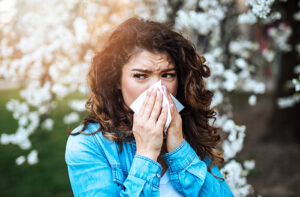Respiratory syncytial virus (RSV) is a common viral respiratory infection. For most people, it causes mild cold-like symptoms, like congestion, cough, and sore throat. But for some, the infection can spread to the lower respiratory tract and become severe.
Because the symptoms of RSV infection are similar to those of influenza and Covid infection and because there is no antibiotic to treat an RSV infection as there is for influenza infection and Covid infection, being prepared for RSV and preventing it are very important as the current viral infection season arrives.
Severe RSV primarily affects infants, older adults, and people with chronic heart and lung conditions. It can be life-threatening, and the new RSV vaccine is designed to protect those at high risk for developing severe infections.
Because it’s new, many people have questions about the vaccine and who is eligible. David Kamelhar, MD, Eric Teller, MD, and our team at Kamelhar-Teller Pulmonology are here to help.
We share more about who is eligible for the RSV vaccine and how to determine if it’s right for you.
Understanding RSV
RSV is highly contagious, and it spreads through close contact with someone who has the virus. The infection primarily affects your lungs and airways, causing symptoms ranging from mild cold-like symptoms to severe respiratory distress.
In healthy adults and older children, RSV is usually a mild infection similar to the common cold. However, infants, older adults, and people with heart and lung problems can develop severe complications from RSV infection.
RSV can lead to severe respiratory illnesses, including bronchiolitis, or inflammation in the small bronchial tubes, and pneumonia. It poses a significant risk to vulnerable populations, and the vaccine offers enhanced protection during RSV season.
RSV vaccine eligibility
This year, the Food and Drug Administration (FDA) approved two RSV vaccines: one for children up to 24 months old and one for adults over age 60.
Infants
Premature infants and those born with medical conditions, like chronic lung disease, congenital heart disease, and immunodeficiency, are at a higher risk of severe RSV infections. Vaccinating at-risk infants can offer them protection and reduce their chances of hospitalization and serious complications.Older adults
People aged 60 years and older are also more susceptible to severe RSV infections, especially those with chronic medical conditions such as heart disease, diabetes, and chronic lung diseases. If you fall into this category, getting an RSV vaccine this season can help lower your risk of RSV-related complications and hospitalization.Which RSV vaccine should you get?
The Food and Drug Administration has approved the vaccine of two pharmaceutical manufacturers, Pfizer and Glaxo. Both are expected to make the patient immune to RSV for more than one year. Because neither has been administered to large numbers of patients as of September 1, 2023, it is not known whether one is more likely than the other to cause significant side effects. Dr. Kamelhar and Dr. Teller will advise you of the general experience in the community and whether it is preferred to receive one or the other version of the RSV vaccine.Conclusion
RSV is a highly contagious virus that can cause serious respiratory illnesses, particularly in infants and older adults with underlying health conditions. The RSV vaccine offers an effective preventive measure to reduce the risk of severe infections, and it’s important to know your options.
It is very important to receive both influenza vaccination and a Covid booster whether or not you are receiving an RSV vaccine.
Find out if you’re eligible for the RSV vaccine with an appointment at Kamelhar-Teller Pulmonology in Midtown East, New York, New York. Call our office at 212-685-6611 or book online now.
Should you get the RSV vaccine?
The RSV vaccine is an essential tool in safeguarding the health of vulnerable populations — but it’s not always easy to figure out if you should get it. The best way to find out if you’re eligible is to talk with your health care team.
The RSV vaccine isn’t part of the routine childhood immunization schedule like some other vaccines. Instead, pediatricians recommend it based on each baby’s unique risk factors. If you’re the parent of a child under 24 months old, ask your pediatrician for personalized recommendations.
For older adults and those with heart and lung conditions, our team at Kamelhar-Teller Pulmonology can help. We may recommend RSV vaccination if you’re over age 60 or if you have certain medical conditions.
We conduct a thorough evaluation of individual risk factors to help determine whether the RSV vaccine is appropriate and beneficial for you. If you’re in a high-risk category, getting vaccinated could help prevent severe RSV-related complications.



